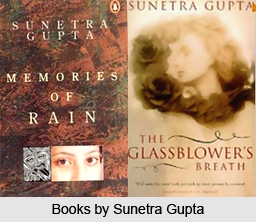 Sunetra Gupta belongs to that Rushdie and post-Rushdie generation of Indian English Writers whose members are essentially cosmopolitan in their cultural and linguistic affinities-though they are often read and marketed as predominantly Indian writers in the West. Being a resident of Calcutta and the university town oxford, in her novels is highlighted a mingle theme of both the cities. The web of postcolonial trend of depicting the human conditions is not missing in her writings. Sunetra Gupta`s novels share many stylistic, narrative and thematic characteristics: a dexterity with literary language, a profusion of canonical references, a tendency towards versions of the stream-of-consciousness technique, a concentration on brilliant protagonists straddling the worlds of science and literature, and thin plots resolved by or revolving around momentous events like deaths, disappearances, drowning, suicides.
Sunetra Gupta belongs to that Rushdie and post-Rushdie generation of Indian English Writers whose members are essentially cosmopolitan in their cultural and linguistic affinities-though they are often read and marketed as predominantly Indian writers in the West. Being a resident of Calcutta and the university town oxford, in her novels is highlighted a mingle theme of both the cities. The web of postcolonial trend of depicting the human conditions is not missing in her writings. Sunetra Gupta`s novels share many stylistic, narrative and thematic characteristics: a dexterity with literary language, a profusion of canonical references, a tendency towards versions of the stream-of-consciousness technique, a concentration on brilliant protagonists straddling the worlds of science and literature, and thin plots resolved by or revolving around momentous events like deaths, disappearances, drowning, suicides.
Memories of Rain: - Entwined with romance and sheer fizz and the quintessential brilliance of love and the disastrous pain of marriage weaves the magical story of "Memories of Rain".
The Glassblower`s Breath: - The Glassblower`s Breadth represents the panting yarn of the maze of women`s mind.
Moonlight into Marzipan: - Moonlight into Marzipan, highly acclaimed book of Sunetra Gupta deals with the shattered dreams of the individuals in the postcolonial world.



















